How Ben Cousins became a ‘train wreck’
THERE was a time when Ben Cousins seemed primed to stay clean. Life was pretty good. In 2010 he opened up about drugs, footy and his hope he would be seen as a ‘normal bloke — with flaws’.
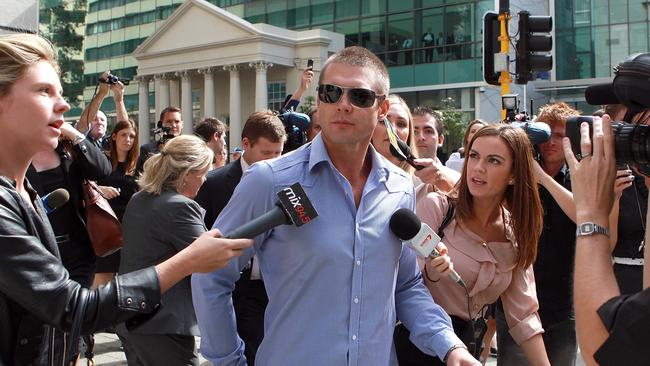
News
Don't miss out on the headlines from News . Followed categories will be added to My News.
THERE was a time when Ben Cousins seemed primed to stay clean.
Life was ‘pretty good’.
In 2010 the Brownlow medallist spoke openly to the Herald Sun’s Patrick Carlyon about his drug history, desire to turn it all around, new love and footy redemption at Richmond.
This is what he said.
A normal bloke, with flaws
DRUG addicts don’t normally boast a deep tan and designer clobber.
They don’t talk about the 6km run they itch to tackle as soon as the interview has ended.
Their stubble isn’t crafted. The white of their teeth does not offset the green of their eyes.
They do not stand to be confused with models lifted from the set of an aftershave commercial.
This drug addict does.
Ben Cousins wants you to know he’s just a “normal bloke — with flaws”.
He speaks of business “opportunities” away from the football realm.
He loves living in Melbourne, which isn’t claustrophobic like Perth. There may be a new romance but, as with the opportunities, he’s not gushing with details.
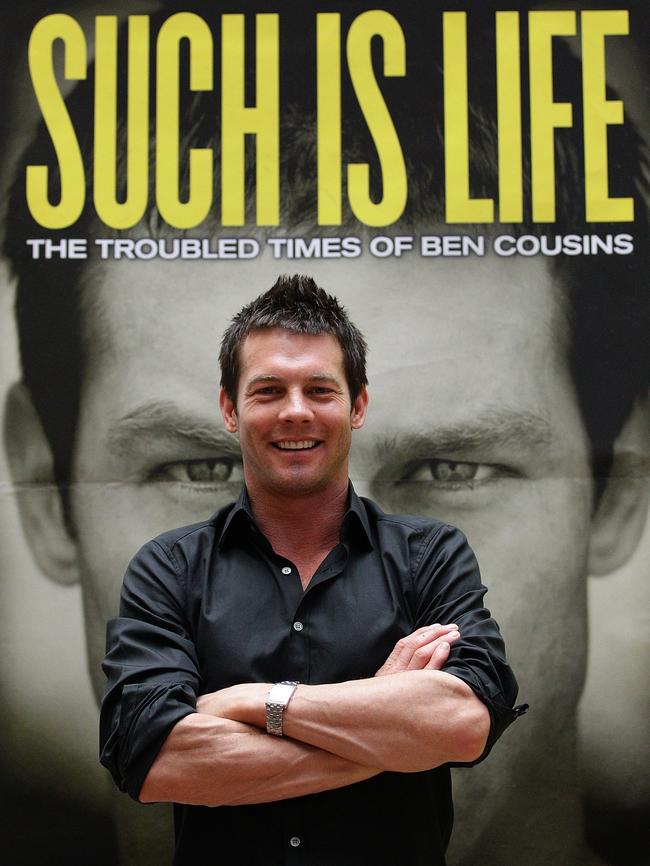

Life’s pretty good, he declares, gazing over the boats on Perth’s Swan River from the second storey of his parents’ home.
It became simpler once he grasped he had an extreme drug problem.
At least, finally, life could be something more than a “smoke and mirrors" act.
Yet there is a catch. It dates back to the age of 17, when he took two ecstasy pills, stared at the stars, and decided drugs were terrific. Part of Cousins still thinks they are.
He remains “vulnerable", he says. His “illness" demands “permanent vigilance".
He cannot say for certain he will not relapse.
If only the psychology of addiction was that simple, he says.
Other mysteries, such as the number of days or weeks or months he has been clean, are not for public airing.
He doesn’t need strangers keeping count for him.
Yet Cousins will describe the “train wreck” he was.
The lies to protect his habit. For 12 years, he smashed his body with illicit chemicals whenever he could get away with it, and sometimes when he could not.
Cousins refuses to disown all aspects of his drug-fuelled past, despite its ravages, and even though he knows the public might expect him to.
He says his drug experiences nurtured some good amid the overwhelming bad.
“It’s never far from my mind, unfortunately,” Cousins says of using drugs.
“(Although) I think the fear of not using, and fear of the future without drugs, is not quite as daunting as it has been in the past.”
Cousins has never before offered such a raw insight into his drug preoccupation.
“I was playing Russian roulette”
Throughout his career, as hints of his double life became more and more pronounced, he hid behind that smirk, what he describes as his “nervous twitch”.
He turned on the smirk when, high from a full day of smoking crack or ice pipes, he turned up at the airport for his 2007 trip to Los Angeles and rehab.
It wasn’t far away when he apologised for his behaviour in a TV statement, a gesture he now dismisses as “patent insincerity”.
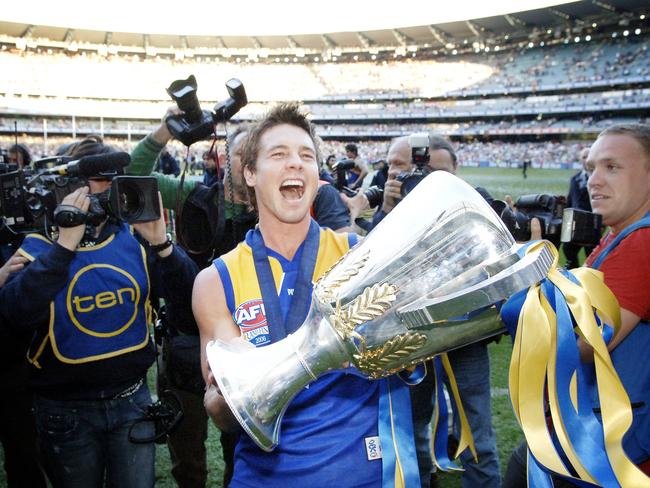
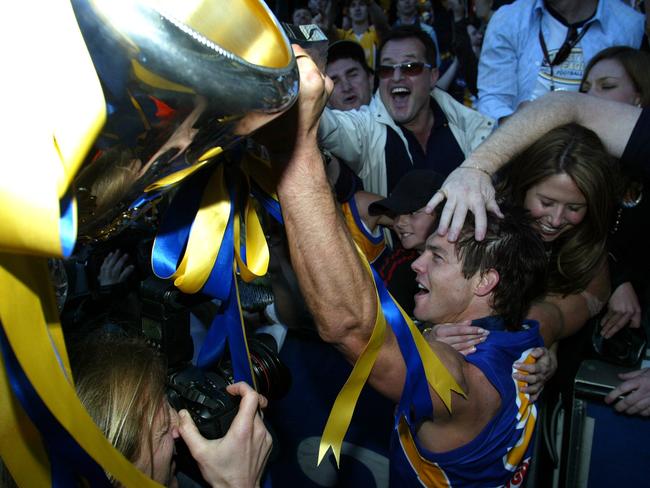
The smirk lurked when he turned up for an AFL hair drug test with a marine-style crewcut to erase the evidence of drug use in the previous months.
It was always there when he disembarked from the plane after interstate matches, abuzz in red wine and Valium, and routinely stumbled through the airport like a drunken Thunderbird.
Today, Cousins has put the smirk away.
He doesn’t want to hide all things any more.
Cousins is willing to field questions about five-day binges. He will spell out how he lost his dignity and mind.
“It was madness what I did — madness,” he says.
“I was playing Russian roulette. I am the luckiest person I know. I could have been locked up. I could have overdosed.”
It’s difficult to identify a single moment that best captures the Cousins saga.
His book, Ben Cousins: My Life Story, offers a score of terrible tales.
In it, Cousins talks about the weird symbiosis of drugs and football.
The reward for training hard was the drugs session, sometimes spilling into next week, that followed.
The damage of such drugs sessions, in turn, motivated him to train hard for the upcoming game.
It’s a rationalisation — what he calls a “go hard, don’t hesitate” mentality.
Somehow, Cousins blended both pursuits for more than decade.
A very public rise, as very private descent
He argues his drug use never jeopardised his on-field talent, though he admits close friends were “baffled” by his unerring ability to play well.
He never used performance-enhancing drugs, he says, besides the caffeine and Sudafed hits that many players once employed.
Cousins claims that football was always his first priority.
Yet by the time the West Coast Eagles suspended him indefinitely at the start of 2007, having just played two best-on-ground performances in pre-season matches, his need to get trashed had snuffed his thrill of the game.
Cousins had just played the two best years of his career — a Brownlow Medal in 2005, the Eagles winning the flag the following year.
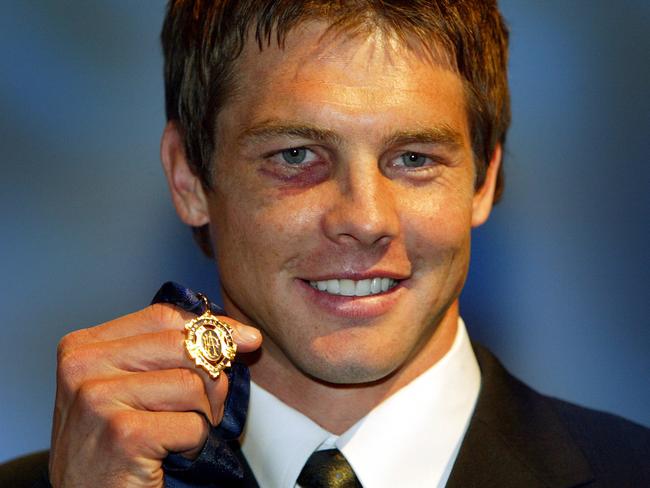
Yet his public rise reverse mirrored his private descent.
By 2007, Cousins’ support mechanisms had, understandably, begun to dissolve.
His girlfriend, Samantha, would leave him.
His parents and family agonised when he went missing for days on end.
Cousins was deceiving others, obviously, as all addicts do. He was also lying to himself.
“The intensity of it, the juggling, you get addicted to that,” he says.
“You probably don’t realise until you are actually removed from it, and you sit down and take a couple of deep breaths, and you go: ‘F ... , that was hard work’.”
For years, Cousins had hunched up to coffee tables, alongside drug-using mates, barely moving except to “rack up” another line of cocaine or pack an ice pipe. He wouldn’t sleep for days.
These excesses were contained to after matches, or at the end of the year when he would indulge in a two or three-month “twister”.
Yet after the 2006 grand final win, the self-imposed controls had frayed.
He’d embraced the scary rush of crystal methamphetamine, which offered him manic efficiency, energy and, he says, clarity — until the “wiring” of his brain started to break down.
This was usually four days or more into a binge.
It comes unravelled
The public got a hint of his troubles in early 2006.
Cousins ran away from his car, leaving Samantha and others in it, when confronted with a late-night booze bus in Perth.
He jumped fences, scaled roofs, scampered through backyards and dived into the Swan River. He tried to cover it up, but would lose the Eagles’ captaincy.
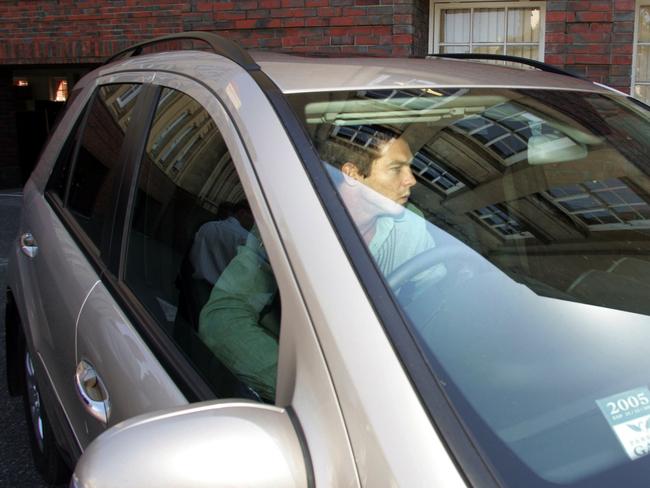
Cousins says he abstained for months before the 2006 grand final.
After the win, he spent sleepless nights on his Perth balcony, listening to music and smoking pipes of crack cocaine. But surely people must have known?
“I think it was the worst-kept secret in footy,” he says.
“I think the AFL knew. I think everyone knew.”
In the 2007 pre-season, he turned up to training haggard, then missed a morning session.
He was in a chemical haze when coach John Worsfold suspended him.
Cousins bumbled out and rejoiced. In under an hour, he figured, he could be trashed.
He went hard, too, spreading his time between strip joints and a recording studio where no one would find him.
It wasn’t until he was bundled off to rehab, against his will, that he grasped the significance of the problem that until then he believed hurt no one bar himself.
Accepting his addiction
Cousins has relapsed many times since his rehab stay in Malibu.
But the four-week stint did shift his thinking. He arrived “off his face”.
He was there only because he was told he wanted to be — if he hoped to play football again.
He learned to accept the label of “addict” which he had for so long rejected.
“A lot of the time it’s about being honest with yourself,” he says.
“Sometimes you can bulls ... yourself and when you do that and you don’t really know you’re doing it to yourself, life can come along and give a little slap.”
————————————————————————————————
On March 20 the Herald Sun exposed the top-secret AFL report into the drugs crisis that shattered the West Coast Eagles in 2007.
* DRUGS, LIES AND COVER-UPS: WEST COAST SCANDAL EXPOSED
* BETRAYAL OF A DUTY OF CARE: WEST COAST CHIEFS LASHED OVER TOXIC CULTURE
* WHAT BEN COUSINS SAID ABOUT HIS DRUG USE
————————————————————————————————
Rehab may have quashed the sense of carefree abandonment that accompanied Cousins’ drug taking, but it didn’t stop him taking drugs.
Cousins returned to Australia and made the apology he didn’t want to make.
“It was madness ... I was playing Russian roulette.”
At the time, he felt no obligation to explain himself to the public.
“It probably would have made my life easier if I’d come out and shed a tear and apologised, told everyone that I’m a changed person and that I’m going to start counselling young people now, and all that,” he said.
“But it doesn’t work like that, unfortunately.”
Cousins persevered, got back into the Eagles team and gathered 38 possessions in his comeback game.
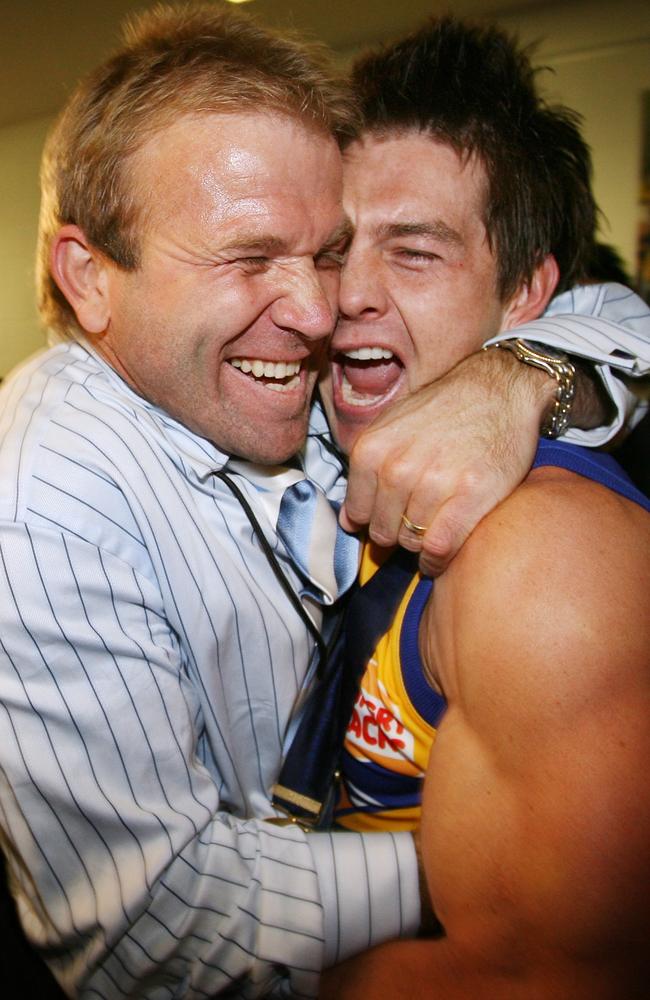
He says he had gone about six months sober when his mentor, friend and former teammate Chris Mainwaring overdosed.
Cousins was with Mainwaring hours before he died. The media joined dots Cousins stridently maintains did not exist.
It was only after Mainwaring died, Cousins said, that he resumed his drug habit.
Ironically, when Cousins was pulled over by police soon afterwards and plastered over the media, shirtless and looking sheepish, it was the first time in five days he was not carrying a large quantity of illicit drugs.
He was sacked from the West Coast Eagles.
‘I lived like a gypsy’
His bender stretched to LA, where he ingested cocaine every 20 minutes or so for five days.
He returned to Australia, was deregistered by the AFL, then headed to the Gold Coast and Sydney for more drugs.
Spare time was his enemy, he says in his book.
He would move from house to house around Perth, using drugs and moving on each time his latest host tired of his stay.
“For a long time there, I lived like a gypsy,” he says.
“It was a pretty tough time for me. I lost a lot of grounding, I’d exhausted my parents’ place and various friends. I couldn’t look too far ahead because I didn’t know what my future held.”
He had wearied of the drugs. Yet the fear of going without them consumed him.
Cousins would eventually set about a future without drugs. He describes a slow shift in attitude. Being clean demanded reducing his life to tiny victories but he found the process humiliating.
Overcoming the stress of paying a phone bill, for example, came to be considered a win. By the time Cousins fronted for his AFL hair drug test in late 2008, he had been clean for more than six weeks. He knows the shaving of his hair added weight to long-held perceptions that he shirked responsibility when it suited him.
“(But) I was desperate to get back to playing footy,” he says.
“I had no faith that people of positions of power could understand the 12 months I’d been through, or could comprehend what drug use or relapse meant.”
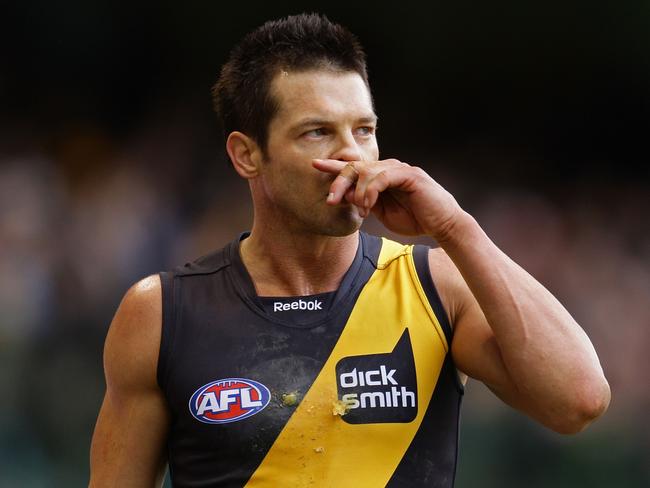
Cousins was grateful to Richmond for taking him in 2009.
It was his chance to straighten his confusing relationship with the game.
Even now, months out of the game and keen to find a healthy balance that eluded him throughout his football career, Cousins cannot distance himself from the sorts of chemical temptations that could have killed him.
Some good friends remain drug users. He must constantly be on guard.
Thinking about drugs is healthier than not, he says, without a hint of a smirk.
There is no happy ending — not yet, anyway.
“I still find myself romanticising about the idea of being able to take it and leave it, and keep it there for a rainy day,” he says.
“But it just doesn’t work that way for me.”
* This interview was first published by the Herald Sun in 2010



